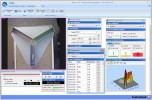Authors
C. Fouquet, G.H. Petit, A. Auffret, E. Gaillard, C. Rovira et al.
Lab
Université P&M Curie, UMR CNRS 7102, Paris, France.
Journal
Neurobiology of Aging
Abstract
To date, no consensus has been reached concerning the age of the earliest onset of age-related cognitive deficits in rodents. Our aim was to develop a behavioral model allowing early and individual detection of age-related cognitive impairments. We tested young (3 months), middle-aged (10 months) and aged (17 months) C57Bl/6 mice in the starmaze, a task allowing precise analysis of the search pattern of mice via standardized calculation of two navigation indices. We performed mouse-per-mouse analyses and compared each mouse's performance to a threshold based on young mice's performances. Using this method we identified impaired mice from the age of 10 months old. Their deficits were independent of any sensorimotor dysfunctions and were associated with an alteration of the maintenance of the hippocampal CA1 late-LTP. This study develops reliable methodology for early detection of age-related memory disorders and provides evidence that memory can decline in some individuals as early as from the age of 10 months.
BIOSEB Instruments Used:
Smart 3.0 - Video Tracking System (SMART30)

 Pain - Thermal Allodynia / Hyperalgesia
Pain - Thermal Allodynia / Hyperalgesia Pain - Spontaneous Pain - Postural Deficit
Pain - Spontaneous Pain - Postural Deficit Pain - Mechanical Allodynia / Hyperalgesia
Pain - Mechanical Allodynia / Hyperalgesia Learning/Memory - Attention - Addiction
Learning/Memory - Attention - Addiction Physiology & Respiratory Research
Physiology & Respiratory Research
 Pain
Pain Central Nervous System (CNS)
Central Nervous System (CNS) Neurodegeneration
Neurodegeneration Sensory system
Sensory system Motor control
Motor control Mood Disorders
Mood Disorders Other disorders
Other disorders Muscular system
Muscular system Joints
Joints Metabolism
Metabolism Cross-disciplinary subjects
Cross-disciplinary subjects Preclinical studies and opioids: role in crisis management in the United States
Preclinical studies and opioids: role in crisis management in the United States 